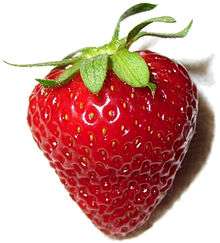Fragaria virginiana
Fragaria virginiana, known as Virginia strawberry, wild strawberry, common strawberry, or mountain strawberry, is a North American strawberry that grows across much of the United States and southern Canada.[1][2] It is one of two species of wild strawberry that were hybridized to create the modern domesticated strawberry (Fragaria × ananassa).
| Fragaria virginiana | |
|---|---|
| In Deception Pass State Park, Washington (state) | |
| Scientific classification | |
| Kingdom: | Plantae |
| Clade: | Tracheophytes |
| Clade: | Angiosperms |
| Clade: | Eudicots |
| Clade: | Rosids |
| Order: | Rosales |
| Family: | Rosaceae |
| Genus: | Fragaria |
| Species: | F. virginiana |
| Binomial name | |
| Fragaria virginiana | |
| Synonyms | |
|
Fragaria ovalis (Lehm.) Rydb. | |
Subspecies
There are four recognized subspecies:
- Fragaria virginiana subsp. glauca (formerly known as F. ovalis)
- Fragaria virginiana subsp. grayana
- Fragaria virginiana subsp. platypetala
- Fragaria virginiana subsp. virginiana
Cytology
All strawberries have a base haploid count of 7 chromosomes. Fragaria virginiana is octoploid, having eight sets of these chromosomes for a total of 56. These eight genomes pair as four distinct sets, of two different types, with little or no pairing between sets. The genome composition of the octoploid strawberry species has generally been indicated as AAA'A'BBB'B'. The A-type genomes were likely contributed by diploid ancestors related to Fragaria vesca or similar species, while the B-type genomes seem to descend from a close relative of Fragaria iinumae. The exact process of hybridization and speciation which resulted in the octoploid species is still unknown, but it appears that the genome compositions of both Fragaria chiloensis and Fragaria virginiana (and by extension the cultivated octoploid strawberry as well) are identical.[3]
Description
Fragaria virginiana can grow up to 4 inches tall. The plant typically bears numerous trifoliate leaves that are green on top, pale green on the lower surface. Each leaflet is about 3 inches long and 1.5 inches wide. The leaflet is oval shaped and has coarse teeth along the edge except near the bottom. This plant has a five-petaled white flower with numerous pistils, surrounded by yellow-anthered stamens. There are ten small green sepals under the petals. The seeds of this plant are developed from the pistils in the centre of the flower which will become dark-coloured fruit (achenes) on the strawberry.[4] The fruit of the wild strawberry is smaller than that of the garden strawberry (Fragaria × ananassa). Botanically, the fruit is classified as an aggregate accessory fruit, but it is commonly called a berry.[5][1] A study showed that F. virginiana can reproduce asexually and sexually.[6]
Cultivation
A popular type called "Little Scarlet" is grown in Great Britain, having been imported from the United States in the early 1900s.
References
- "Fragaria virginiana (common strawberry)". Go Botany. New England Wildflower Society. Retrieved 28 March 2018.
- Jepson Manual Treatment
- Morphological and molecular variation among populations of octoploid Fragaria virginiana and F. chiloensis (Rosaceae) from North America. Harrison R, Luby J, Furnier G, Hancock J., Am J Bot. 1997 May;84(5):612., pp. 612–620.
- Wendy Deng and Charlie Marshall, Characteristic point, "Fragaria virginiana (Wild Strawberry) Rosaceae", Retrieved 28 March 2018.
- "Fragaria virginiana". Plant Finder. Missouri Botanical Garden. Retrieved 28 March 2018.
- Wilk, J., A. T. Kramer and M. V. Ashley. 2009. High variation in clonal vs. sexual reproduction in populations of the wild strawberry, Fragaria virginiana Mill. (Rosaceae). Annals of Botany 114: 1413-1419.
